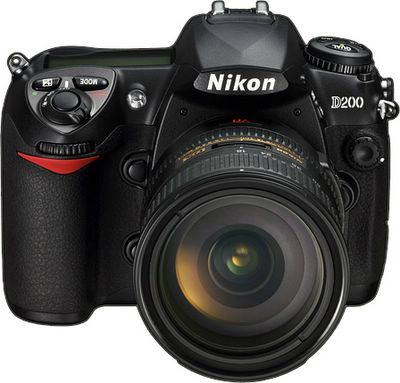For many years, I have wanted to buy a single-lens reflex (SLR) camera — called a system camera in some countries, including Sweden. Until recently, I have been unable to justify the expense. When one purchases an SLR, one must also purchase at least a couple of lenses to go with it. The better lenses can cost hundreds or more; when a flash and accessories are added, the total can come to several thousand dollars. Also, when one buys a camera and some lenses for it, one locks oneself into that particular manufacturer's lens mounting system. In other words, lenses from one manufacturer typically cannot be used with cameras from another manufacturer. So the purchase of an SLR is not a decision I take lightly.
Having said that...
About a month ago, Nikon announced the new D200 digital SLR camera, and I think I'm going to get one. The D200 offers a lot of capability for the money, and after using a Nikon CoolPix 4500 for a few years I would definitely consider buying another Nikon.
Ideally, I would like the Canon EOS 5D because it has full frame 35mm sensor. Like most DSLRs, the Nikon D200 has a smaller 28mm-wide sensor and my initial feeling was that a smaller sensor was inferior to a full-sized 35mm sensor. However, the Canon EOS 5D costs at least $3000, putitng it well beyond my means. Other SLRs with full frame sensors are even more expensive, so if I'm going to get an SLR now, I'll have to settle for one without a full-frame sensor.
I did some reading online to familiarize myself with the debate. Digital Photograhy Review has a good discussion of the pros and cons of full-frame versus cropped sensors. DPReview also has a good preview of the D200.
At first I thought it would be a good idea to purchase normal 35mm lenses so that I can use them with any Nikon 35mm SLR camera, including any future Nikon DSLR that incorporates a full frame 35mm sensor. My plan was to get the following lenses to go with my D200:
Kit 1Notably absent from this list are a good zoom lens and a high power telephoto. I could of course add these later as funds become available. If I purchase these lenses online when I'm in the U.S., I can get all four for under $1000. This would be a very respectable starting kit. and would be suitable for many kinds of photography. However, lacking a zoom lens, the setup would not be well suited to impromptu shots or tourist photography.
Photographer and confessed Nikon afficionado Ken Rockwell doesn't believe Nikon will produce a camera with a full-frame 35mm sensor. For reasons primarily related to cost, he argues that smaller sensors have advantages. Rockwell praises the D200, and is convinced that the fleixbility and portability of the smaller DX lenses are worth the drawbacks. Rockwell is especially fond of the new 18-200 VR.If I buy regular 35mm lenses but only use them with DX cameras, it could be considered overkill. With this in mind, I reevaluated my selection of lenses above, and came up with an alternative set:
Kit 2
So as I see it, it's a trade-off:
Kit 1:Pros: high quality (fast) lenses; versatile; flexible; well suited to many kinds of photography.
Cons: less convenient; no zoom lens; no high power telephoto; slightly heavier.
Pros: good lenses; very convenient; good for general purpose photography and macro work; a bit lighter.
Cons: the 18-200 is not well suited to low light photographyand cannot be used with non-DX cameras.


No comments:
Post a Comment